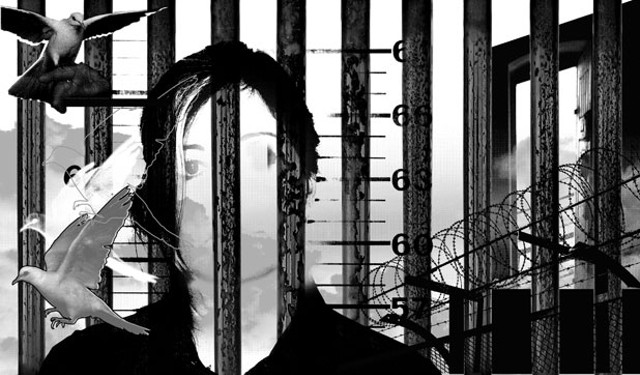Published August 6, 2008 at 5:56 a.m. | Updated October 25, 2017 at 9:55 a.m.
June 2008, somewhere in central Vermont
Bob answers his cellphone in the backseat. My wife, he mouths. "Yep, we're going to jail," he tells her, then snickers.
I run a furtive sign of the cross over my face and chest.
We are, in fact, going to jail on this lovely summer evening; the kind of evening on which I'd rather be eating ice cream and counting fireflies. As a matter of fact, I would rather be doing - hmm, let's see - anything than going to jail. Bob, Jay and I are headed to the Southeast State Correctional Facility in Windsor, the women's prison, to talk about our personal experiences with drugs and alcohol to the inmates there. Our 12-step credo holds that we share our recovery experiences to those still suffering from addiction.
I was just telling them the story of how I came to serve two months in a Texas jail last winter, and explaining why I feel compelled to take this unpleasant trip down memory lane. I remember the moment I was released the way some people remember precisely where they were when J.F.K. was shot, or their cinematic moments of 9/11.
It was 2 a.m. on Easter Sunday, 2007, when I was let back into what inmates wistfully call "the free world" - or "the free" for short. I emerged from a gritty loading dock into the pre-dawn, downtown streets to discover that the city was an ethereal snow globe, flashing yellow with the traffic lights. The temperature hovered around 32 degrees; the guards in out-processing had warned those of us huddled in the holding tank - a cinderblock box with the acoustics of a dog pound - that it was "colder 'n hell" out. We met that weather report with gasps and groans. It never snows in Houston, let alone on Easter Sunday, and most of us wore little more than jeans and T-shirts after having mercifully changed out of our orange jumpsuits.
I had on the same plaid trousers and pink cashmere sweater I'd been wearing in court on the day I was sentenced, an ensemble that earned me the nickname "teach" in the holding tank. The pants, which had fit perfectly then, now hung lank over my hipbones. I had lost 15 pounds, the one perk of being incarcerated. My roots had grown in, revealing increasing numbers of wiry, silver strands. A witch-like tuft of hair was growing out of the beauty mark - OK, mole - on my chin.
Stepping outside for the first time in months, the city seemed different to me with snow falling on it. My fiancé, who was waiting to pick me up, lit me what was probably the only cigarette I have ever deserved. When we got home to our apartment about a mile south of the jail, he heated up some tomato soup while I used the bathroom . . . alone! Then I sat at our kitchen table and marveled at how strange the quiet was, how thick it felt in my ears.
******
By group consensus, it is decided that I will be the guest speaker at the prison tonight. I am terrified. I don't want to do it, but I need to for closure, or for healing, or for proof that I can beat my limbic brain in a face-off. More than a year has passed since I served my sentence and, even 2000 miles away, I am still jumpy around cops, wary of government buildings.
Mostly I am scared that the place will feel and smell and look like my jail, and that I will have a déjà-vu panic attack. I also fear, irrationally, that I will not be allowed to leave. I am so paranoid that earlier in the day I called my fiancé's brother - a Texas police officer - to ask him if he would run an open-warrants check on me before my visit.
"Get outta here! You kidding me?" he demanded. I swear I heard his eyes roll in their sockets.
"No, I'm not . . . I mean, what if I have some old warrant that I don't know about?" I asked, the terror rising in my voice, "and they (gulp) hold me there?"
This is the moment in the story when the main character (me) should be slapped across her hysterical face.
One-thousand-and-fifteen women were processed through the Vermont Department of Corrections last year; 86 of them are currently incarcerated at the prison in Windsor, which has a capacity of 155. The "most frequently occurring offense," according to the Department of Corrections, is "False Pretenses," or fraud, followed closely by drug and/or alcohol charges. The latter do not factor in the number of offenses indirectly related to alcohol and drug abuse, e.g., writing hot checks in order to obtain money for drugs, or falsifying a prescription for drugs.
Fifty-six percent of Vermont's female inmates are classified by the state as "mentally ill." And since, technically speaking, my own experience closely mirrors the data, you could say these women are my people. I certainly have an affinity for them. Jail is a bonding experience in the way that combat is, and I see female inmates like my sisters-in-arms, as it were.
As we pull up the prison driveway, the first thing I notice is razor-wire curls the size of hula-hoops enclosing the facility. As far as prisons go, this one is handsome: It's a converted dairy farm nestled in the green folds of Windsor, Vermont, with a campus comprising red and white buildings, brick dormitories, silos, green lawns and an outdoor recreation area with a sandy volleyball pit.
There is surprisingly little fanfare involved in entering the grounds - only one guard; a metal-detector walk-through, a sign-in clipboard, and two security doors that buzz us through a fenced-in walkway. Prisons are Orwellian by nature, and, accordingly, we neither see nor hear the staffer who grants us entry. Stranger still, no one escorts us into the meeting room, an ordinary-looking space with large windows, puke-green linoleum floors and hard plastic chairs.
Some of the inmates straggle in, wearing street clothes. Lucky, I think, before mentally slapping myself. The chatter today centers around the rumor that, sometime early next year, this population will be transferred to the St. Johnsbury facility, as the Windsor prison is slated to become a men's work camp. The women are grumbling about this change as we arrange the chairs in a circle.
One woman wears her oversized headphones right up until the moment I am introduced. I realize then that I desperately want these women to like me, perhaps more than I should, but, more importantly, I hope that my story will pass on even a minuscule grain of hope. I begin by telling them about the fateful day when my life changed in an instant.
******
May 5, 2005, Houston, Texas
I've renamed the day Cinco de Malo, given the circumstances. I sit in a slim, glassed-in holding cell that reminds me of a fish tank. Across from me is a zaftig blonde who has just vomited on herself after some serious head lolling. I am drunk, though now sobering up quickly in the manner of an on-screen damsel who has been administered smelling salts.
The air is thick, damp, hot and stagnant, and smells like excrement mixed with bleach, blood and day-old bread. The fluorescent lights are so hot and white that I begin to see spots, or at least to imagine that I do. This is a place in which your mind plays tricks on you. I am in a heightened state of sensitization: the noise, the light, the smell, the rawness, the filth, the hard edges. All of it adds up to a sucker-punch of sensory information.
The experience of jail is an inherently violent one, too. My temples and scalp throb. My ears ring with tinnitus and my eye sockets pulse with pain and tension.
On paper, I am a good Catholic girl from New England. I am from a good family, which is to say that I am a white, college-educated woman with access to the systemic privilege that comes with my particular packaging. That includes the plausible expectation that I would never see the inside of a jail, unless as a pro-bono attorney.
We're freezing now, the motley assemblage of wayward women. The clean blankets we were issued not 30 minutes before are inexplicably taken away to be laundered. There is a lot of complaining and back-talk. The guards are unmoved. Shhh, I scream inside, thinking it can't be good to anger them. Better to be sycophantically polite. I am so white.
My left upper arm oozes blood from an eye-socket-like gash, and my jeans seep the color of Karo syrup. A lanky black girl, who somehow reminds me of Big Bird, asks what happened to me. "I dunno," I mutter. "I got into a car accident." I tell her that I'd been arrested for DWI. She nods. "Hope you didn't kill no one," she says.
"I don't know," I manage to whimper. What I do know is that I had crashed my Jeep late the previous night after consuming enough wine to intoxicate Sunny Von Bulow. I know that a woman was taken to the hospital. And, I know that in a contretemps yet to be fully appreciated, I am in jail for the first time in my 29 years.
The ensuing weekend - before I would piece together more of the night's events and learn what had become of the injured woman - would prove to be my longest on record.
******
I go on to tell the women at Windsor the rest of my story. How, after my initial arrest, I remained in Texas for two and a half more years in a protracted judicial process, which included a five-day felony trial. I tell them that the woman I crashed into had a cracked tibia, two days before her wedding, which forced her to be wheeled down the aisle by her father. Ulti-mately sentenced to 121 days in jail, I spent 60 days locked up.
I tell the women how I came to do a terrible thing one night, and how that terrible thing helped me find the pearl that was my real life.
I tell them that I stopped drinking in February 2006, and - as cliché as it sounds - that I came to see my mistake as an opportunity to learn something important. Why did I quit? Because I had no reason left not to. The vague puffery and irrevocableness of my youth had waned; I could no longer shrug off the lies, the hangovers, the blackouts, the secrets. I could no longer postpone whoever it was I was meant to be.
How did I change my life? The philosophical answer is that I didn't change but that some consequences, help and love changed me. The practical answer is that I started to talk on the phone a lot. I went to rehab. Certain life decisions I used to fumble at, I now ran by a little committee. Suggestions were made that I fill my day with a few simple efforts: make the bed; read a meditation; fix a meal; ask for what I need; clean as I go; help when possible; say thank you.
******
For me, the "experience" was my guru. If I had a time machine, the only thing I would go back and change is the harm I caused others.
I tell the women that, in my story, everything worked out. Maybe it could for them, too. Finally, I say that there is life after jail, and I realize that I'm saying it as much for myself as for them. And I realize I feel better.
There is a long pause. After a few minutes, the girl with the headphones breaks the silence:
"Were you in the hole? 'Cause I got put in the hole here last week for using, but it wasn't that bad."
"No," I say.
"Was jail in Texas bad?" she probes. "I heard it sucks."
"Yes, it does," I confirm. "All jail sucks."
"Ain't that the truth," she says, and we all laugh.
It's hard to say whether my story resonated; prisoners are an inscrutable bunch. Bravado trumps vulnerability, and even in intimate meetings, the preferred modes of communication are sarcasm, misdirection and vague narratives.
One of the women approaches me afterward and thanks me for sharing my story. She tells me that there are so many drugs "inside," she is having trouble staying clean. She has managed to do so 10 days.
The statistics are grim, especially the rates of drug and alcohol abuse in Vermont. Incarcerated women often face intersections of addiction, abuse, mental illness, shame and social stigma, and a lack of education and resources that make getting and staying clean nearly impossible.
Prison is really getting to her, this woman admits, but she's more worried about what will happen when she gets out.
I'll never forget the week leading up to my own release: It felt more like a long, miserable month. The heat vents leaked Freon, making everyone sick; the deputies blamed the foul smell on our shower shoes. One of the 48 other inmates with whom I was housed had a staph infection that turned her arm into a puffy red billy club. We had gone through two cell searches and two - surprise! - strip searches. I had a bad case of vertigo caused by an inner ear infection. The guards had stopped giving us tampons and toilet paper. Two fights had broken out - one over bottom-bunk rights, and another between two prostitutes.
The point is, I was ready to go home. And for me, home meant New England. Even though it was considered contraband, I kept a photograph stuck to my bunk with the adhesive strips from a stamp book, so that I could remember what waited for me on the outside. It was a picture of Keith and me, from the trip we made to Vermont for my birthday, standing outside in an October snow flurry. Vermont had become our new starting line.
That same week, the woman who stood alphabetically behind me during our thrice-daily inmate count was getting out, too. When the day ending her six-month stint arrived, she ran around the cell in gleeful circles, hugging everyone and slapping high-fives. "Hel-lo, world!" she hollered, "HELLO, WORLD!"
Even the dour day guard had to crack a smile.
More By This Author
Speaking of...
-

Vermont DOC to Overhaul Inmate Grievance System Following Audit
Dec 19, 2022 -

Vermont's Prisons Open to Visitors Again, Ending a Two-Year Restriction
Apr 14, 2022 -

Video: Musicians Jeremiah and Annemieke McLane Move into their New Home
Mar 24, 2022 -

Hard Time: Vermont Hasn't Lost a Single Prisoner to COVID-19. But at What Cost?
Mar 23, 2022 -

Three Prison Staffers Test Positive for COVID-19
Aug 5, 2021 - More »
Comments
Comments are closed.
From 2014-2020, Seven Days allowed readers to comment on all stories posted on our website. While we've appreciated the suggestions and insights, right now Seven Days is prioritizing our core mission — producing high-quality, responsible local journalism — over moderating online debates between readers.
To criticize, correct or praise our reporting, please send us a letter to the editor or send us a tip. We’ll check it out and report the results.
Online comments may return when we have better tech tools for managing them. Thanks for reading.













































